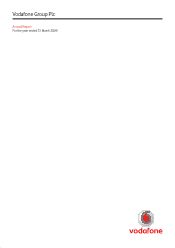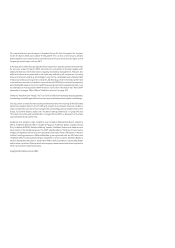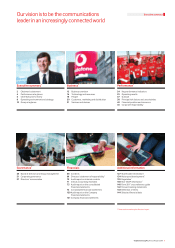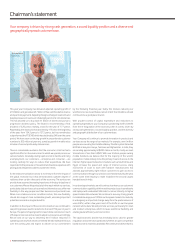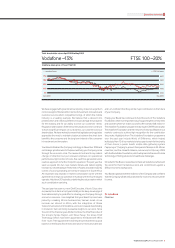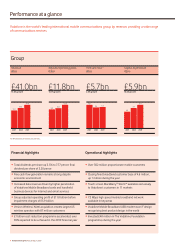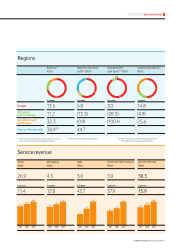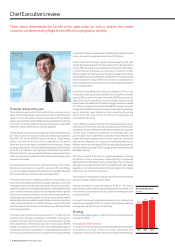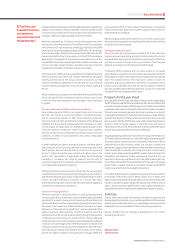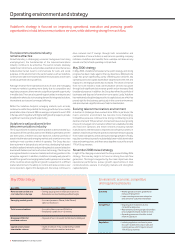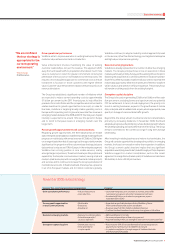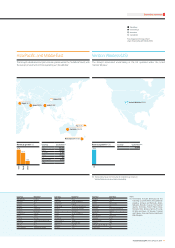Vodafone 2009 Annual Report Download - page 4
Download and view the complete annual report
Please find page 4 of the 2009 Vodafone annual report below. You can navigate through the pages in the report by either clicking on the pages listed below, or by using the keyword search tool below to find specific information within the annual report.
2 Vodafone Group Plc Annual Report 2009
Chairman’s statement
This year your Company has delivered adjusted operating profit of
£11.8 billion and generated £5.7 billion of free cash flow before licence
and spectrum payments, helped by foreign exchange movements and
despite pressure on revenue in challenging economic circumstances.
This has allowed us to buy back £1 billion of shares and pursue a
progressive dividend policy. The Board is recommending a final
dividend of 5.20 pence, making a total for the year of 7.77 pence.
Regrettably, the share price has declined by 17% since the beginning
of the year, from 154.3 pence to 127.5 pence, but has nonetheless
outperformed the FTSE100 which has declined by 24% over the same
period. We have seen continuing growth in proportionate customer
numbers to 303 million at year end, as well as growth in mobile voice
minutes of use and particularly data services.
There is considerable evidence that the economic crisis has had a
significant effect on the environment in which we operate, across our
various markets. Inevitably, during rapid economic decline and rising
unemployment, our customers – enterprise and consumer – are
looking carefully for ways to reduce their expenditure. We have
responded to the pressure on household and business expenses with
pricing plans designed to address customers’ needs.
So the telecommunications sector is not immune from the impact of
the global recession but it has demonstrated a greater degree of
resilience than certain other parts of the economy. The services we
provide have assumed increasing importance in the day to day lives of
our customers. We see this particularly in the way in which our services,
par ticularly data services such as email and internet access, offer new
flexibility in the way people lead their business and personal lives.
When more stable economic conditions return, this new flexibility
should also support more sustainable growth, unlocking important
potential social and ecological benefits.
In addition to the impact of the economic downturn, we continued to
see pricing pressure lead to reductions of around 15% year on year in
Europe. The period of rapid growth in new mobile customers in much
of Europe is now over and we need to adjust our resources accordingly.
We are well on our way to delivering the £1 billion reduction in
operating costs to which we are committed. We will maintain this focus
over the coming year and expect to deliver on our commitment
by the following financial year. Sadly, this involves reducing our
workforce but we nevertheless remain intent that Vodafone should
continue to be a good place to work.
With prudent control of capital expenditure and reductions to
operating expenditure, your Company is positioning itself to benefit
from the re-invigoration of the economy when it comes, driven by
strong cash generation, a sound liquidity position, and the diversity
and geographic distribution of our customer base.
Your Company will continue to promote innovation in products and
services across the range of our markets. For example, over 6 million
people are now using the Vodafone Money Transfer system (branded
M-PESA in Kenya) in Kenya, Tanzania and Afghanistan. In total, they
are sending approximately US$200 million a month, mostly as small
transactions of less than US$20. With over 4 billion people owning
mobile handsets, we believe that for the majority of the world’s
population, mobile is likely to be the primary means of access to the
internet. Higher speed networks in markets such as South Africa and
Egypt increase the speed and range of internet access. Using
economies of scale to work with handset manufacturers has
allowed approximately eight million customers to gain access to
communications through our ultra low cost handsets during the year,
at the same time helping to make Vodafone the second largest
handset brand in India.
In our developed markets, we will continue to enhance our customers’
communication capability, with innovative products such as netbooks
and laptops with embedded SIM cards to connect directly to higher
speed mobile data networks. We continue to see very strong growth
in mobile data usage, over 100% in our European markets. Our industry
is undergoing an important change away from the predominance of
voice traffic; within a few years most of the traffic on our European
network will be data. We will promote services, particularly for small
and medium enterprises, which increase workforce flexibility and
enable greater efficiency and cost control.
The rapid economic decline has inevitably led to calls for greater
regulation and some have questioned whether an open competition
based economic model is sustainable. We continue to believe that it is.
Your company is driven by strong cash generation, a sound liquidity position and a diverse and
geographically spread customer base.
Sir John Bond
Chairman

